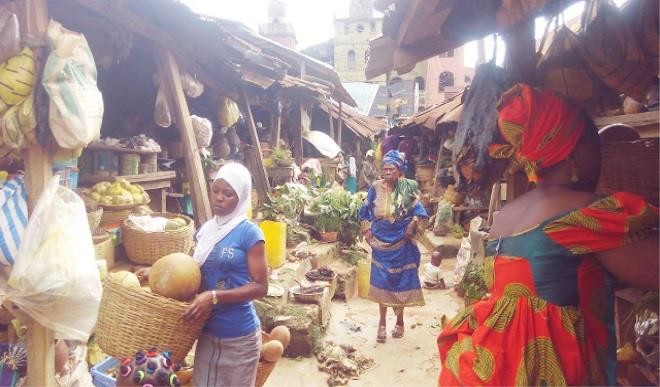
From a few hundred metres, one can perceive the odour of some of the items used to make traditional medicine. There is a shrine at the centre of the market where Ogun, the god of iron, was believed to have resided. There is also a mosque beside the shrine.
In this market, coded languages are often used for transactions and a visitor is easily identified from exchange of pleasantries. Having observed that the sellers would not entertain questions from Weekend Magazine, our reporter posed as a buyer to be able to interact with the traders.
After the greetings in a typical Osogbo dialect, “how much is Eru-Alamon?” he asked. “It is N500,” Mrs. Mopelola Sande, the woman in the shop answered.
As the bargaining began, a woman, identified as Esther, stormed the shop with her baby strapped on her back. She interrupted the transaction as she hurriedly demanded for herbal mixture for her sick daughter.
Ester removed her daughter from her back and presented her to Sande, explaining her illness. Esther said a test conducted in the hospital could not diagnose any disease.
Sande then told her about the efficacy of the herbal medicine that she would give her and assured her that the baby would be okay if she could pay N7,500. Ester negotiated the price and eventually settled for N6, 000.
She assembled the medicine. She also took some herbs from another shop a few metres away. She brought out a bottle, stocked it with the herbs and handed it over to Esther, explaining the dosage.
In a chat with Sande, she said unlike Esther that came straight to the market, many people would go to herbalists for such treatments. She said it is not all the herb sellers who could prescribe like she did for Esther.
She said: “We don’t encourage patients to come to the market without first consulting a herbalist. Many of us in the market cannot prescribe medicines. I did it for that woman because I know the treatment of the ailment she complained of. For those who visit herbalists, the medicine may not be ready instantly. It may take up to five days. It is because some herbalists would prefer to send someone to the bush to harvest some of the herbs and they would buy others in this market,” Sande explained.
She added: “The herbalists don’t come to the market by themselves. They send people here to buy herbs for them. That’s why it is common to see teenagers buying things in this market. Most of the herbalists have their customers here and those they usually send would just come to us to buy the herbs.”
Omowumi Mudasiru is another herb seller. She inherited the business from her mother and vowed that she would bequeath it to her children. She told Weekend Magazine that she was proud of it.
She said: “I would only be fulfilled when I see my children in this market selling herbs because my mother was happy that I’m selling herbs here. It must continue like that. My mother too inherited it from her grandma and it has been like that for long. We will continue to pass it on from generation to generation.”
She said the efficacy of traditional medicine can not be compared to orthodox medicine. “Herbal medicines are consumed without preservation while pharmaceutical drugs lose potency due to preservation with chemicals.
“Go and check pregnant women and nursing mothers who take ‘agbo’ (herbal mixture) and you will see that their kids are very strong and healthy. You cannot compare them with the children of the elite who only go to hospitals and perforate the body of the kid with different needles in the name of injection.”
On the insinuation that women who sell herbs are witches, frowning, Mudasiru said: “Do I look like a witch as you see me? Did you see blood in my mouth? We are not witches. We save lives. We help people. Why would you even insinuate that we are witches, (angry), you can go now.”
Chief Ganiyu Adebayo is the chairman of an association of the herbalists known as ‘Isegun Ewenje’ in Osogbo. For him, there is no competition between orthodox and traditional medicine. He said they both have their separate roles and could complement each other.
Adebayo said: “Can any medical doctor treat spiritual attacks if my mothers, the owners of this earth (eulogising the witches) are dealing with their victims? Except if that doctor is one of the children of my mothers, he cannot heel the patient and he may even run into trouble and pay with his life if he is not careful.”
Adebayo said he usually sent his patients to visit hospitals and undergo tests for proper diagnosis of their ailments before he herbal treatment.
During her recent visit to Osun, the Acting Director-General of the National Agency for Food and Drug Administration and Control (NAFDAC), Mrs. Yetunde Oluremi said the agency frequently received complaints of abuse, spurious label claims, illegal adverts and hawking of herbal medicines by producers and marketers of the products in the state. She said NAFDAC was not comfortable with the development.
Oluremi also took her advocacy to the Ooni of Ife, Oba Adeyeye Enitan Ogunwusi, seeking his assistance for NAFDAC to succeed in its resolve to safeguard the health of the citizenry.
She said she was not oblivious of the efficacy of traditional herbal medicine and hinted that series of research were going on at the National Institute for Pharmaceutical Research and Development on some traditional herbs to situate them appropriately in health care delivery.

 Join Daily Trust WhatsApp Community For Quick Access To News and Happenings Around You.
Join Daily Trust WhatsApp Community For Quick Access To News and Happenings Around You.


